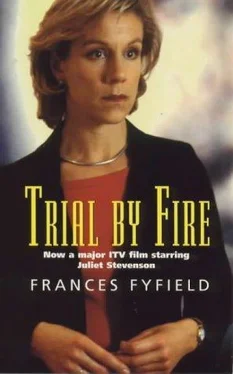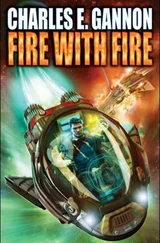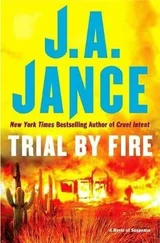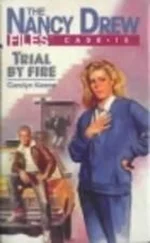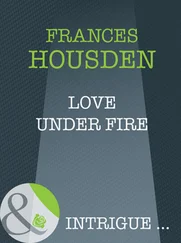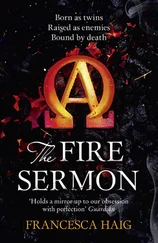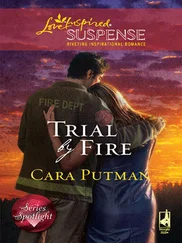Frances Fyfield - Trial by Fire
Здесь есть возможность читать онлайн «Frances Fyfield - Trial by Fire» весь текст электронной книги совершенно бесплатно (целиком полную версию без сокращений). В некоторых случаях можно слушать аудио, скачать через торрент в формате fb2 и присутствует краткое содержание. Жанр: Полицейский детектив, на английском языке. Описание произведения, (предисловие) а так же отзывы посетителей доступны на портале библиотеки ЛибКат.
- Название:Trial by Fire
- Автор:
- Жанр:
- Год:неизвестен
- ISBN:нет данных
- Рейтинг книги:3 / 5. Голосов: 1
-
Избранное:Добавить в избранное
- Отзывы:
-
Ваша оценка:
- 60
- 1
- 2
- 3
- 4
- 5
Trial by Fire: краткое содержание, описание и аннотация
Предлагаем к чтению аннотацию, описание, краткое содержание или предисловие (зависит от того, что написал сам автор книги «Trial by Fire»). Если вы не нашли необходимую информацию о книге — напишите в комментариях, мы постараемся отыскать её.
Trial by Fire — читать онлайн бесплатно полную книгу (весь текст) целиком
Ниже представлен текст книги, разбитый по страницам. Система сохранения места последней прочитанной страницы, позволяет с удобством читать онлайн бесплатно книгу «Trial by Fire», без необходимости каждый раз заново искать на чём Вы остановились. Поставьте закладку, и сможете в любой момент перейти на страницу, на которой закончили чтение.
Интервал:
Закладка:
Trial by Fire
Frances Fyfield
CHAPTER ONE
There were foxes as wild and shy as wolves in northeast London, haunting the dead railway lines by night in search of sustenance, running into gardens where the need was great, abandoning the Petticoats of the city to forage in bins. In the crowded outskirts where city clawed at country in a flurry of picnics between mismatched towns, the presence of summer and constant supply of discarded food lessened necessity and made it negligible.
High summer for this fox, sufficiently fed on old hamburgers to cope with present hunger, but nothing in her stomach as compelling as this fruity stench, this rich smell of carrion. She quivered from the Sharp, vicious snout of her to the down-pointed tail, eyes bright with curiosity, hair stiff with anticipation, a predator salivating in the darkness.
Fox scratched at the loose- earth, dry and unresisting around the human hand. She examined and sniffed. A mottled set of fingers, earth-stained but still delicate white and shiny in the waning dark. Her firm teeth gripped the fingers, bit and gnawed the splintering bone within, then paused, shy and wary. In sudden urgency, she closed her jaws over the knuckles of the hand, dug paws into the ground for purchase, and pulled. Better a prize to carry home, not to eat but to bury, less greed in her now than pragmatism.
The hand was weighted by a heavier body, resisted beyond the elbow as the earth resettled around the form with a sigh. Fox grasped the forearm, encountered larger bone, pulled again to the tune of a slight cracking sound. Growling softly, she persisted as the light grew, shaking her head from side to side, unable to shift the obstacle. Pausing in the struggle to survey the problem, she tested the air, heard in the distance a car on the road, the infinitesimal dawn sounds of human life gathering force far away, yet too close for comfort.
She turned her head from the carrion and spilt soil in sudden disinterest, scratched, twisted, and danced in the new warmth spotting her coat between the trees, a ritual dance in the rising light, graceful and carefree in celebration. Then she cleaned the earth from her jaws and slipped away into the undergrowth for home. Sunlight, warmth, freedom and safety were preferable even to food.
The grave she left untidy, as if a sleeper had turned the blanket in the middle of a dream. Beneath the surface, the larvae continued their slow and steady movement, out of sight, busy, busy, busy.
One hand remained visible above the ground, finger splintered and chewed, knuckle browner and stickier than before, softened by teeth and the abrasive tongue. It was the shroud of flies that indicated a presence, buzzing in a furious crowd and attracting the dog running through the woods when the sun retreated. The arm protruded crookedly, the wrist at right angles like a signpost. The owner of the dog, once a poacher, regarded the sight with laconic curiosity only slightly tinged with shock; he sat and debated with his slow soul what to do next, holding his animal firmly by the collar as it twisted to escape, enraged by the smell of fox, frightened by the presence of death.
As the man rose and plodded towards a telephone, he was relieved he had not seen the remnants of a face, relieved the fox had not done worse. Such a pale, slender arm, the colour of a well-hung, badly plucked bird. Once a woman's.
At eight forty-five in the evening the village of Branston was already somnolent. After seven-thirty, the trains from Liverpool Street via twenty-one stations east, a long and rattling ride in carriages with dirty windows, became less frequent, and even the alternative route, Central Line to Epping, equally elderly rolling stock and even noisier, had diminished its reluctant service. The commuters had faced their last hazard of the day: none remained in city wine bars on an evening like this. 'We live in the country,' they said. 'Wonderful, have to get home.
Ever heard of Branston? No? You haven't lived. Marvellous spot, hasn't really hit the market yet, house prices not bad, why, we only paid… You must be mad, living in Surrey.
Go east, man, go east, the only place to be.' So they laboured uphill from the station carrying tributes to spouses and children, wine in carrier bags held by men, while the women carried decorative materials and ornaments in endless pursuit of style for the solid-built houses, some old, some hideously new, which formed the fabric of Branston. Flanked by woods on one side, flat fields on the other, approached by three roads hidden by hedges, Branston nestled quietly.
There was a main street, comfortably ugly and mellow. The Coach and Groom, Bario's plush pink and grey restaurant – 'Terrific place, better than anything we've found in London, 'I mean, there's everything here' – and a few miles beyond all that, the wider consumer vistas of Chelmsford with Marks and Spencer, Habitat, and all the disguises the human soul could require, places where Branston refugees escaped on Saturdays to avoid contact with Mother Earth.
Branston consisted of workers, a village of respectable and ambitious house-owning commuters, pushing themselves ahead by sheer effort, taking advantage of still old-fashioned schools for their new-fashioned kids, watched with amazement by the few High Street natives for their habit of leaving their homes empty for all of twelve hours a day.
Branston did not possess a history. It mirrored the taste of its current age and was resurrected from oblivion by the need for housing an Olympic stone's throw from London.
Previously its three streets had almost died, deserted by young and old alike, the young from boredom and lack of opportunity, the old from pneumonia induced by dampness and the right time to go. Now the remnants found themselves revisited, adopted, and conquered by the descendants of their more ambitious children.
In addition to those with no instinct to go south or west, there were those seeking the nearest patch of greenish field to the East End convenient for market trade, a touch of fraud, or a place to own a house acceptable to a mother still locked in the fumes of Bethnal Green with her pub and all the blacks. Branston had never been much of a community, simply a place. Now its inhabitants tried to make it into a village. The village format was slightly unconvincing, with the High Street boasting one confused supermarket, one small branch of Woolworth's, a shop selling kits for homemade wine and beer, and alongside the restaurant a kind of cafe called La Taverna, a pizzeria, and a burger bar, also selling kebabs for those who preferred foreign.
The rest of the ten shops included one featuring swanky tracksuits for the unconverted East End wives, one more prosaic and expensive sportswear, an upmarket greengrocer, a jeweller, a delicatessen, and two newsagents, the only ones that were there in the first place, source of all gossip. Aside from these establishments, which maintained half-day closing and lunch hours, the rest strove to cater for the custom living in the newly developed housing estates. Parallel to the shops was a small green, usually hidden by buses panting at two stops before turning around to return to bigger things. People gathered on this green trying to make village gossip, hampered by their underlying London reluctance to know one another.
She could see the point. Occasionally she enjoyed the prettiness and the space, succumbing to the instinct to enjoy all aspects of life whenever possible. But much of the time Helen West, emigre from the dirtier streets of Islington and grimy offices of very central London, found herself hating Branston with a quiet passion that surprised her.
Not at every moment, and not during this one. Whistling, with her hands in the suds covering last night's washing-up and looking out through the diamond-shaped windows of the modern house in Invaders Court, Helen told herself she had no excuse for hating any place – places were not important enough for the expenditure of that kind of emotion. She slammed a dish on the draining board and did not stop it slithering back into the water.
Читать дальшеИнтервал:
Закладка:
Похожие книги на «Trial by Fire»
Представляем Вашему вниманию похожие книги на «Trial by Fire» списком для выбора. Мы отобрали схожую по названию и смыслу литературу в надежде предоставить читателям больше вариантов отыскать новые, интересные, ещё непрочитанные произведения.
Обсуждение, отзывы о книге «Trial by Fire» и просто собственные мнения читателей. Оставьте ваши комментарии, напишите, что Вы думаете о произведении, его смысле или главных героях. Укажите что конкретно понравилось, а что нет, и почему Вы так считаете.
